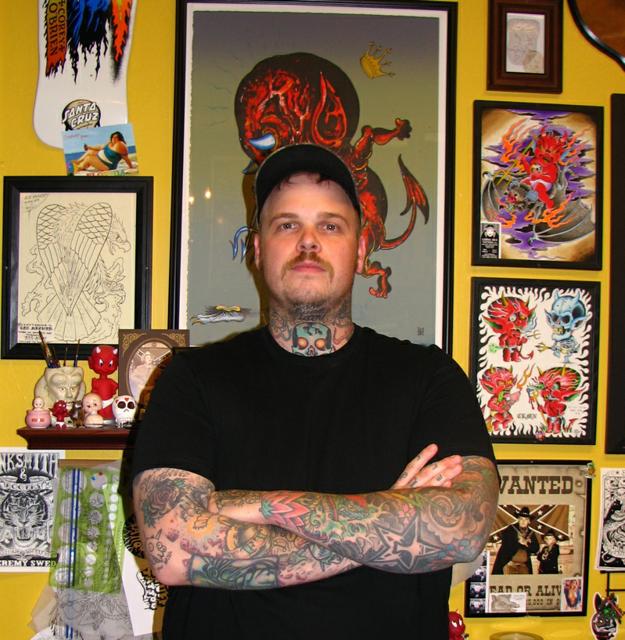So you’re looking to get some ink: a new tattoo, something cool that lets the world know what you’re about. Being frugal, though, you start searching online to find the best deal in town. Eventually you stumble on a Facebook page for a local tattoo artist. After a few rounds of back-and-forth, he gives you his home address. You’re somewhat skeptical, but the guy seems OK, and the price is way less than what the local tattoo shops charge. What have you got to lose?
A lot, according to the Buncombe County Health Department.
Under North Carolina law, both the artist and the place of work must have permits. Tattoo parlors are required to have specific cleaning equipment, disinfecting chemicals and an autoclave, a device that uses high-pressure steam to sterilize instruments. Tattoo rooms must also have easily sanitized surfaces, and each artist must have a separate work area. Furniture can’t be upholstered in fabric, which could absorb blood or other fluids. A lavatory for washing hands should also be close by.
And while the law doesn’t forbid a tattoo artist to work from home, it’s very unlikely that someone would meet all those requirements, says David Mease, the Health Department’s food and lodging supervisor.
Look for the permits, which should be posted in the establishment, he advises. Customers should also be on the lookout for basic sanitation practices, such as washing hands before setting up the work area and changing gloves frequently during the tattooing. Needles should always be new, in a sterile package that the artist opens in front of you. If it’s necessary to shave the area where the tattoo will be, a disposable razor should be used, along with disposable ink caps.
Once finished, a new tattoo should be covered with a sterile bandage. Unlicensed artists often use plastic wrap, which creates a breeding ground for bacteria by keeping in heat and preventing proper airflow. And since it’s not absorbent, it could allow leaking body fluids to drip onto clothing and furniture, potentially spreading disease.
Mease also notes that most of the complaints the department receives about unlicensed tattoo artists come from the county’s established tattoo parlors. “They’re paying rent on a building, they’re maintaining their place of business, and I think anyone who’s out there not doing that is misrepresenting their group, so they want to make us aware of it,” he explains.
Danny Reed, who owns Hot Stuff Tattoo in West Asheville, also emphasizes the dangers of getting tattooed by an unlicensed artist. “If someone hasn’t been working in a licensed shop, one that’s reputable, they might not know how to properly apply a tattoo and how to be clean about it. It’s just like going to a doctor who works out of his house, who doesn’t have a medical license.”
Home-based artists, says Reed, are unlikely to have the special solvents and cleaning supplies that legitimate tattoo shops buy from tattoo- and medical-supply companies. Improper sanitation, he notes, can lead to the spread of blood-borne pathogens such as those causing hepatitis.
Reed adds that when he’s known of unlicensed artists working out of their homes, he’s asked them to desist, because of the danger and the negative impact inferior work has on both the art and the business of tattooing. “Too many people want to be a tattooer these days, and only a small percentage of those people have what it takes to be one,” he asserts.
Asked what people should look for in a tattoo artist, Reed stresses the importance of considering the artist’s capabilities as well as the shop’s sanitation and professionalism. Study the individual’s portfolio and get to know his or her style, Reed advises. Some of Asheville’s 23 tattoo shops, he reports, are run by people who started out as unlicensed, home-based artists. But if they didn’t go through a proper apprenticeship, they may produce poor work.
“They may have an autoclave and be able to keep the area sterile, but as far as actually knowing how to tattoo, that’s another issue.”
— Christopher George can be reached at 251-1333, ext. 140, or at cgeorge@mountainx.com.



Before you comment
The comments section is here to provide a platform for civil dialogue on the issues we face together as a local community. Xpress is committed to offering this platform for all voices, but when the tone of the discussion gets nasty or strays off topic, we believe many people choose not to participate. Xpress editors are determined to moderate comments to ensure a constructive interchange is maintained. All comments judged not to be in keeping with the spirit of civil discourse will be removed and repeat violators will be banned. See here for our terms of service. Thank you for being part of this effort to promote respectful discussion.